Quarterly news from the MCEA Duluth Office
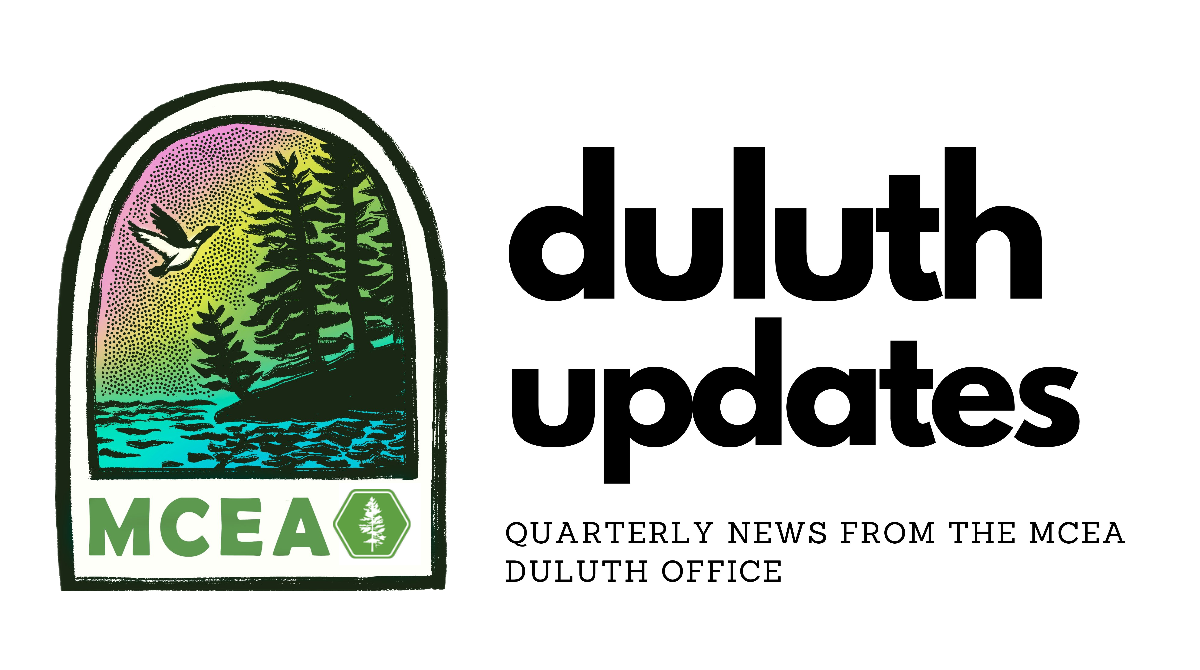
Welcome to the second quarterly update from MCEA’s Duluth Office, with content tailored for our local audience. This newsletter provides additional insights into what we’re up to, how MCEA is thinking about the environmental issues that impact northeastern Minnesota, and how you can get more involved. Thank you for reading.

Pictured: MCEA and partners at the June 2019 PolyMet shareholders meeting in Toronto, as covered by MPR . Glencore increased its ownership of PolyMet to 72% at that meeting.
Glencore Completes Ownership of PolyMet
This month, Glencore is completing its long-intended takeover of PolyMet. On October 30, after a process underway for years, PolyMet shareholders voted to turn over the final 18% of shares to Glencore, completing what was essentially an inevitability at that point.
For years, MCEA has warned of this probability. It is common for a “junior” mining company to move a permit application forward and for a major company like Glencore to exert more and more control over time. Glencore’s first financing transaction with PolyMet was in 2008, and slowly but surely, all small stockholders have been squeezed out since, including local Minnesota stockholders.
None of this is an accident, and staff at MCEA has been working hard to alert the courts and public to the likely ramifications. As I shared in the Duluth News Tribune last summer, “it's interesting that, after years of pitching PolyMet as a semi-local outfit, one of the world's most problematic mining companies wants to just waltz into Minnesota through a corporate back door."
So what does this mean? First, it means that we cannot avoid the fact that when it comes to PolyMet, really, we’re dealing with Glencore. MCEA’s Eric Ini wrote about Glencore’s troubling record in this piece in the Reformer earlier this year. Second, the permits issued in 2018 were issued in the name of PolyMet. Governor Walz has acknowledged that his administration will need to address the impacts of the new ownership. Third, and not surprisingly, Glencore has indicated its intent to now take PolyMet private. In the past, PolyMet was at least subject to the transparency required by securities regulations as a company traded on the Toronto Stock Exchange and New York Stock Exchange. This is how we know about PolyMet’s scenarios for expansion, details that have been a crucial component of MCEA’s air permit case. (For more on that, click here.) With PolyMet 100% owned by Glencore, the public will have even less information about the company’s true intentions.
Moving forward, we expect stringent review of what Glencore’s purchase means for the PolyMet proposal. There's far too much at stake for anything less.
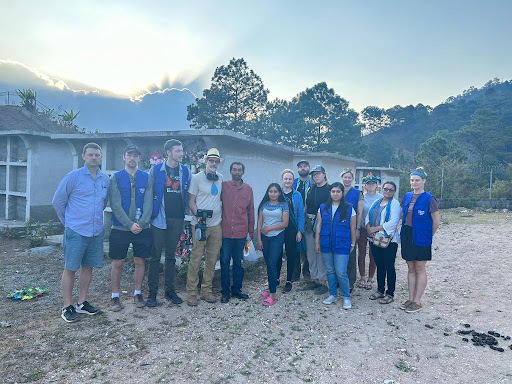
Pictured: The delegation in Azacualpa, Honduras, at the site of a cemetery desecrated and moved for the benefit of US-based Aura Minerals.
MCEA Travels to Honduras
Earlier this year, four MCEA staff members joined a delegation to Honduras on the invitation of the human rights organization Witness for Peace. As people who work on mining issues here in Minnesota, we were grateful for the opportunity to put our local mining work in the global context, and learn directly from communities impacted by the industry elsewhere in the world. Joining the delegation from MCEA were JT Haines, Adam Reinhardt, Katie Cashman, and Kathryn Hoffman.
On our trip, we met with communities impacted by industrial agriculture, international tourism, and the global mining industry. We visited Azacualpa, a community in western Honduras that is being directly harmed by a US and Canada owned open-pit sulfide mine. We celebrated the life of Berta Cáceres, an amazing indigenous rights activist and Goldman Environmental Prize winner who was assassinated in 2016 for defending the land and water rights of her people. And we met with government officials in the capital city, including at the US Embassy, where we shared with officials some of what we were hearing in the communities we visited.
Back in Minnesota, we look forward to sharing about our trip with MCEA supporters and interested members of the public. On Monday of last week, we participated in an excellent event hosted by UMD and the College of St. Scholastica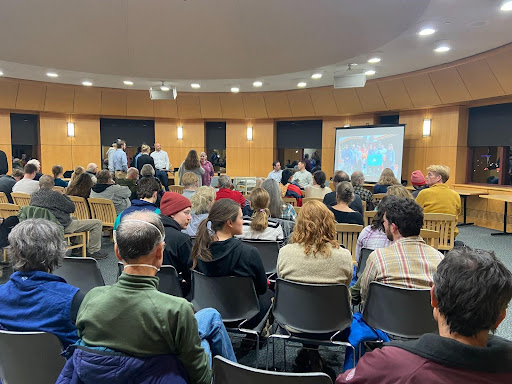 and joined by Senator Jen McEwen, Tribal Elder Ricky DeFoe, co-delegates Jenna Yeakle from Sierra Club, Shanai Matteson from Honor the Earth, and Jackson Faris, and a full house in the library rotunda.
and joined by Senator Jen McEwen, Tribal Elder Ricky DeFoe, co-delegates Jenna Yeakle from Sierra Club, Shanai Matteson from Honor the Earth, and Jackson Faris, and a full house in the library rotunda.
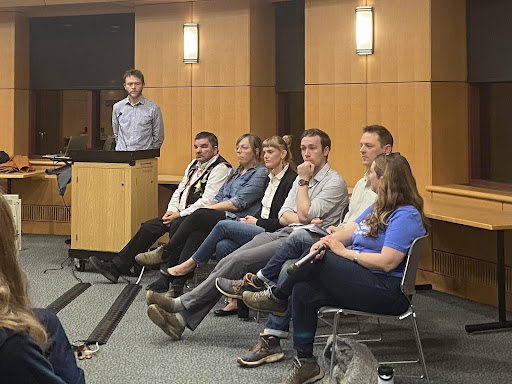
As Ricky said in his comments, “we are part of a community of respect.” It is a privilege to do this work and to have opportunities like this trip to think more broadly about how we are all connected, and how the struggle for justice and a clean environment in Honduras relates to the struggle here. We hope to participate in a similar event in the Twin Cities sometime in early 2024.
To learn more about the Witness for Peace organization and some of the on-the-ground work happening in Honduras today, visit https://www.hondurasnow.org/ and https://www.solidaritycollective.org/.
Forest Service Denies Lutsen Expansion Application
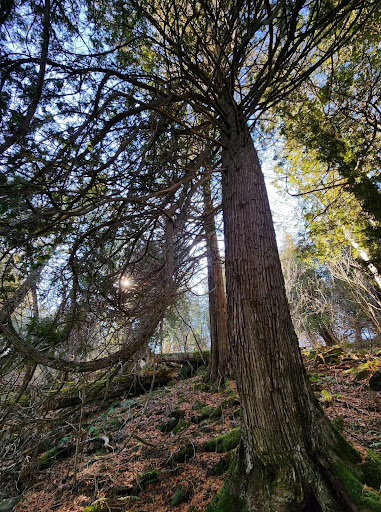 As you may have read in our last update, MCEA has been involved with the Lutsen Mountains proposal to expand its ski resort into 500 acres of Superior National Forest and 1854 Treaty area. Our public comment to the US Forest Service in December 2021 emphasized that the review process must uphold treaty rights (the Grand Portage, Fond du Lac, and Bois Forte Chippewa Bands are parties to the 1854 Treaty), account for impacts to water quality, and recognize that clear-cutting 140-year-old old growth forest could have irreversible consequences.
As you may have read in our last update, MCEA has been involved with the Lutsen Mountains proposal to expand its ski resort into 500 acres of Superior National Forest and 1854 Treaty area. Our public comment to the US Forest Service in December 2021 emphasized that the review process must uphold treaty rights (the Grand Portage, Fond du Lac, and Bois Forte Chippewa Bands are parties to the 1854 Treaty), account for impacts to water quality, and recognize that clear-cutting 140-year-old old growth forest could have irreversible consequences.
On August 25, the US Forest Service denied the Lutsen expansion proposal. In its news release, the Forest Service stated that “several significant factors led to the no action decision, including impacts to tribal resources and access, potential effects to numerous natural and cultural resources specific to this unique area, negative impacts to the Superior Hiking Trail users and backcountry skiers, impacts to the adjacent Lutsen Scientific and Natural Area, and a variety of natural resource impacts, including hydrology, water quality and quantity” -- in line with MCEA’s comment. On October 9, Lutsen Mountains filed objections to this decision, which the agency is currently reviewing and the team at MCEA will be tracking.
We appreciate the efforts of all who have contributed to this important conversation, especially the Bands who have special status in this matter. For more information and the agency’s decision, you can visit the US Forest Service project website directly. You can read a timeline of events on our MCEA website as well.
Pictured: Old-growth cedars would have been impacted by Lutsen’s proposal. Photo courtesy of Jaci Christenson and Heidi Nielsen-Meade.
Partner Statement on “Critical Minerals"
In September, the national organization of one of our local climate allies -- Minnesota Interfaith Power and Light (MNIPL) -- published a statement entitled “Critical Minerals, Human Rights, and the EV Supply Chain.” As you know from our Mining the Climate Crisis series, we are concerned that the mining industry’s rhetoric around mining and the renewable energy transition overlooks better options and key considerations. Helpfully, IPL’s statement includes much of this context, including the importance of Free Prior and Informed Consent of Indigenous Peoples, the existence of alternative battery technologies, the value of recycling, the option of diverting minerals from less essential uses, the need to update mining standards, and of course the negative impacts of new mining generally. We appreciate IPLs statement and positive contribution to the conversation.
Thank you for reading.
As a 501c3 nonprofit, MCEA relies upon contributions to make this important work feasible. In our last fiscal year, 53% of our annual expenses were covered by donations from individuals like you. If you haven’t already, we’d love for you to join the ranks of our donors who are building a thriving future.